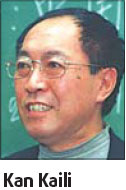On roaming charges, he pressed a hot button
Updated: 2008-01-23 07:15
He calls himself a "big mouth". Industry insiders dub him a "loose cannon". And mobile-phone users see him as their flag-bearer.
Kan Kaili, 63, is a telecommunications professor at Beijing University of Posts and Telecommunications (BUPT).

And his latest brush with fame is because his article last February on sohu.com claimed that roaming "costs zero" for China Mobile and called for roaming fees to be abolished.
The suggestion sparked calls from millions of netizens for the cancellation of the fees, which led to the first public hearing on mobile phone roaming tariffs Tuesday in Beijing.
The hearing was inconclusive with the country's top economic planner saying that a "reform plan will be released as soon as possible".
But in the last two weeks, netizens and representatives to the hearing have come to believe that Kan has "caved in" to pressure - on January 3, he defined roaming fees and said the price slash would not be as great as many expect.
"I have been misunderstood but I was prepared for this. I put forward my views (on roaming fees) not to become a hero. I did that simply because it had to be done," he told China Daily, adding that it would be against his conscience if he did not reveal excessive profits made by service providers.
"Nonsense" is his reply to some suggestions that he adopts a rebellious role because he wants to win clicks on the Internet.
"I say no because I believe that financial revenue and social effect are the only criteria to judge technology. I will say no to all technologies that are useless, no matter how advanced they are. I will also tell the emperor he wears virtually nothing."
Kan said his evaluation criteria for technology was learnt at Stanford University, where he received his telecommunications PhD in 1984.
He was sent by the central government to Stanford in 1979 after graduating from Tsinghua University; and was one of the first group of government-funded students.
After Stanford, he worked at telecommunications company Pacific Bell in the US for two years before returning in 1987 and became a researcher at the then ministry of posts and telecommunications. He went to Stanford again to do his post-doctorate studies in 1989, and came back to the ministry in 1997.
In 2000 he joined BUPT.
Before the roaming fee issue, Kan was in the headlines for saying no to "xiaolingtong", a made-in-China personal handy-phone system in 2003.
|
|
|
||
|
||
|
|
|
|